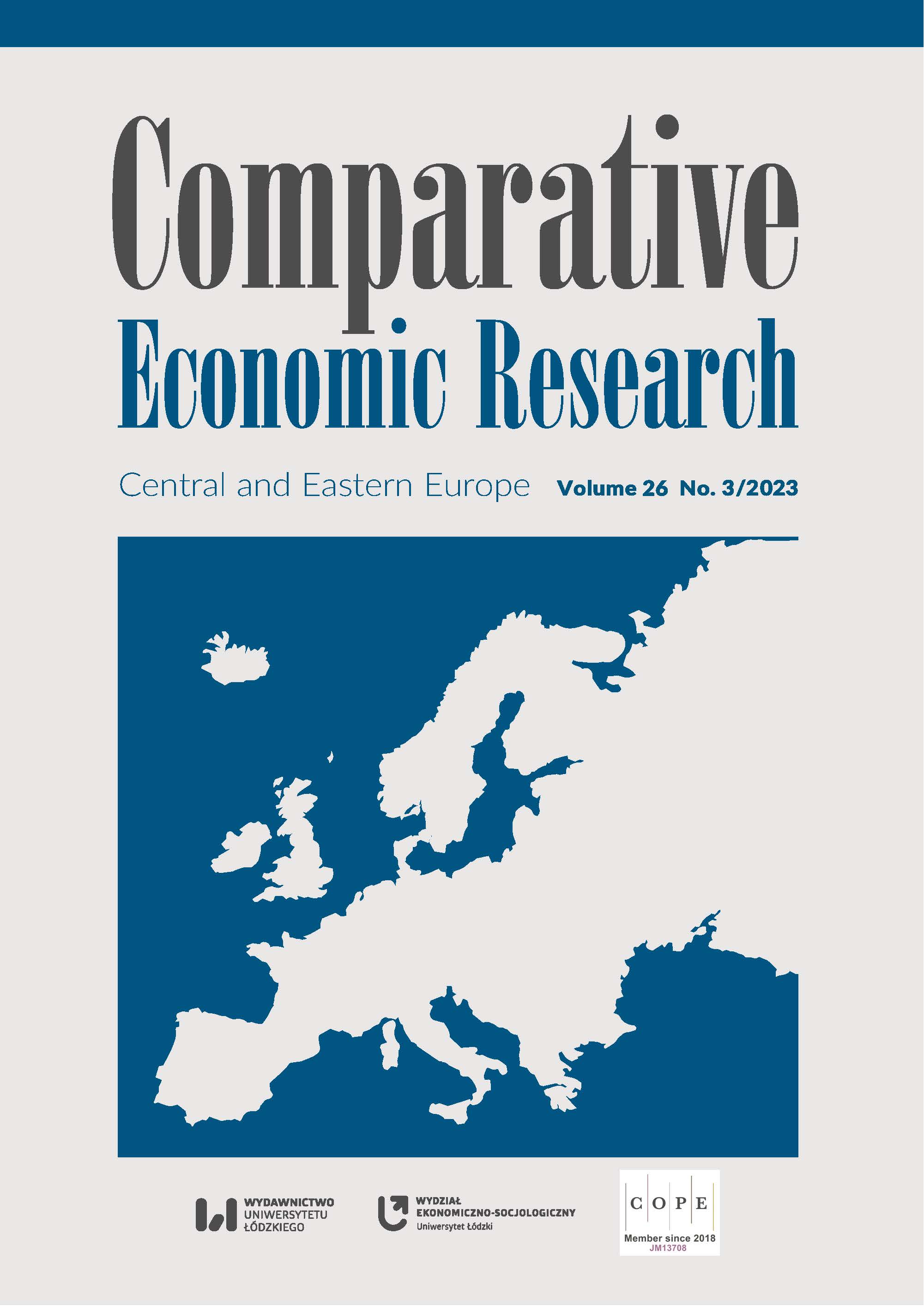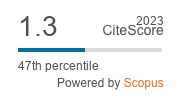Intersectoral Flows in the Economies of the Visegrad Group Countries
DOI:
https://doi.org/10.18778/1508-2008.26.20Keywords:
Visegrad Group Countries, flow of funds, system of national accounts, institutional sectorsAbstract
We present a comparative study of flows between institutional sectors in the economies of Czechia, Hungary, Poland and Slovakia, with particular emphasis on the role of the foreign sector. The purpose of our study is to determine the strength and nature of inter‑sectoral ties in the analyzed countries and point out the similarities and differences between them. The research method is based on the sequence of all transactions included in the System of National Accounts (SNA): product transactions, primary income generation and allocation, income distribution, and financial instrument transactions. The study is distinguished by its consistency and balance within the SNA. The method used to transform data into a payer‑payee matrix guarantees the preservation of these properties. It creates a new perspective for assessing the sensitivity of economies to external processes.
It is the first such comprehensive comparative study, providing unambiguous and replicable results based on a standardized accounting system that operates in all European countries. The period covered by the study (2000–2020) allows us to draw interesting conclusions about the processes that took place during and after the accession to the European Union. The results indicate, inter alia, an increase in the involvement of the foreign sector, primarily in production processes (import, export) and investment. Particularly noteworthy is the high degree of financialization of the Hungarian economy.
Downloads
References
Abad, P. (2005), Compiling the flow of funds of the Spanish economy, “IFC Bulletin”, 21, pp. 43–60, https://www.bis.org/ifc/publ/ifcb21.pdf (accessed: 24.08.2022).
Google Scholar
Ambroziak, Ł., Chojna, J., Gniadek, J., Juszczak, A., Miniszewski, M., Strzelecki, J., Szpor, A., Śliwowski, P., Święcicki, I., Wąsiński, M. (2020), The Visegrad Group – 30 Years of Transformation, Integration and Development, Polish Economic Institute, Warsaw, https://pie.net.pl/wp-content/uploads/2021/02/Wyszechrad-ENG.pdf (accessed: 24.08.2022).
Google Scholar
Błaszczyk, M.C. (2022), Selected Aspects of European Integration of the Visegrad Group Countries, “Comparative Economic Research. Central and Eastern Europe”, 25 (2), pp. 81–97, https://doi.org/10.18778/1508-2008.25.14
Google Scholar
DOI: https://doi.org/10.18778/1508-2008.25.14
Cagetti, M., Holmquist, E.B., Lynn, L., McIntosh, S.H., Wasshausen, D. (2012), The Integrated Macroeconomic Accounts of the United States, “Finance and Economics Discussion Series”, Divisions of Research & Statistics and Monetary Affairs, Federal Reserve Board, Washington, https://doi.org/10.17016/FEDS.2012.81
Google Scholar
DOI: https://doi.org/10.17016/FEDS.2012.81
Copeland, M.A. (1949), Social Accounting for Moneyflows, “The Accounting Review”, 24 (3), pp. 254–264, https://www.jstor.org/stable/240684 (accessed: 24.08.2022).
Google Scholar
Dworak, E., Grzelak, M.M. (2018), Innovativeness of the Polish economy in relation to the Visegrad Group countries, “Economic and Environmental Studies”, 18 (2), pp. 515–529, https://doi.org/10.25167/ees.2018.46.3
Google Scholar
DOI: https://doi.org/10.25167/ees.2018.46.3
Federal Reserve Statistical Release (2021), Financial Accounts of the United States, https://www.federalreserve.gov/releases/z1/release-dates.htm (accessed: 24.08.2022).
Google Scholar
Jabłońska, M. (2020), Comparative Analysis of R&D in the Visegrad Group Countries in the Years 2004–2018, “Comparative Economic Research. Central and Eastern Europe”, 23 (4), pp. 31–44, https://doi.org/10.18778/1508-2008.23.26
Google Scholar
DOI: https://doi.org/10.18778/1508-2008.23.26
Karas, D. (2022), Financialization and state capitalism in Hungary after the Global Financial Crisis, “Competition & Change”, 26 (1), pp. 29–52, https://doi.org/10.1177/10245294211003274
Google Scholar
DOI: https://doi.org/10.1177/10245294211003274
Klein, L.R. (2003), Some Potential Linkages for Input-Output Analysis with Flow-of-Funds, “Economic Systems Research”, 15 (3), pp. 269–277, https://doi.org/10.1080/0953531032000111772
Google Scholar
DOI: https://doi.org/10.1080/0953531032000111772
Lazorcakova, E., Dries, L., Peerlings, J., Pokrivcak, J. (2022), Potential of the bioeconomy in Visegrad countries: An input-output approach, “Biomass and Bioenergy”, 158, 106366, https://doi.org/10.1016/j.biombioe.2022.106366
Google Scholar
DOI: https://doi.org/10.1016/j.biombioe.2022.106366
Lengyel, I., Kotosz, B. (2018), The Catching up Processes of the Regions of the Visegrad Group Countries, “Comparative Economic Research. Central and Eastern Europe”, 21 (4), pp. 5–24, https://doi.org/10.2478/cer-2018-0024
Google Scholar
DOI: https://doi.org/10.2478/cer-2018-0024
Miller, R.E., Blair, P.D. (2009), Input-Output Analysis: Foundations and Extensions, Cambridge University Press, Cambridge, https://doi.org/10.1017/CBO9780511626982
Google Scholar
DOI: https://doi.org/10.1017/CBO9780511626982
Molendowski, E. (2021), The Competitive Position of the Economy of Poland (against the Backdrop of the Visegrad Group Countries and the Baltic States) – Changes and Determinants in the Post-accession Period, “Comparative Economic Research. Central and Eastern Europe”, 24 (1), pp. 85–102, https://doi.org/10.18778/1508-2008.24.05
Google Scholar
DOI: https://doi.org/10.18778/1508-2008.24.05
Palumbo, M., Parker, J. (2009), The Integrated Financial and Real System of National Accounts for the US: Does It Presage the Financial Crises?, “American Economic Review”, 99 (2), pp. 80–86, https://doi.org/10.1257/aer.99.2.80
Google Scholar
DOI: https://doi.org/10.1257/aer.99.2.80
Piroska, D. (2021), Financial Nationalism and Democracy: Evaluating Financial Nationalism in Light of Post-Crisis Theories of Financial Power in Hungary. Financial Nationalism and Democracy: Evaluating Financial Nationalism in Hungary in Light of Post-Crisis Theories of Financial Power, [in:] A. Pickel (ed.), Handbook of Economic Nationalism, Edgar Elgar, Cheltenham, https://doi.org/10.2139/ssrn.3846022
Google Scholar
DOI: https://doi.org/10.2139/ssrn.3846022
Rostadsand, J.I. (2004), Net lending of households and non-profit institutions serving households: an analysis of discrepancies between financial and non-financial accounts, “Norges Bank Economic Bulletin”, 04, Q3, https://norges-bank.brage.unit.no/norges-bank-xmlui/bitstream/handle/11250/2504443/rostadsand.pdf?sequence=1&isAllowed=y (accessed: 24.08.2022).
Google Scholar
Shrestha, M., Mink, R., Fassler, S. (2012), An Integrated Framework for Financial Positions and Flows on a From-Whom-to-Whom Basis: Concepts, Status, and Prospects, International Monetary Fund, https://www.nber.org/system/files/chapters/c12835/revisions/c12835.rev0.pdf (accessed: 24.08.2022).
Google Scholar
Strnad, V. (2022), Les enfants terribles de l’Europe? The ‘Sovereigntist’ Role of the Visegrád Group in the Context of the Migration Crisis, “Europe-Asia Studies”, 74 (1), pp. 72–100, https://doi.org/10.1080/09668136.2021.1976730
Google Scholar
DOI: https://doi.org/10.1080/09668136.2021.1976730
The Financial Crisis and Information Gaps – Report to the G–20 Finance Ministers and Central Bank Governors (2009), Financial Stability Board and International Monetary Fund, Washington, https://www.imf.org/external/np/g20/pdf/102909.pdf (accessed: 24.08.2022).
Google Scholar
Trębska, J. (2018), Polish households’ savings in the financial intersectoral linkages, “Equilibrium. Quarterly Journal of Economics and Economic Policy”, 13 (2), pp. 307–329, https://doi.org/10.24136/eq.2018.016
Google Scholar
DOI: https://doi.org/10.24136/eq.2018.016
Tsujimura, K., Mizoshita, M. (2003), Asset Liability-Matrix-Analysis Derived from the Flow-of-Funds Accounts: the Bank of Japan’s Quantitative Monetary Policy Examined, “Economic Systems Research”, 15 (1), https://doi.org/10.1080/0953531032000056936
Google Scholar
DOI: https://doi.org/10.1080/0953531032000056936
Tsujimura, M., Tsujimura, K. (2011), Balance sheet economics of the subprime mortgage crisis, “Economic Systems Research”, 23 (1), pp. 1–25, https://doi.org/10.1080/09535314.2010.523414
Google Scholar
DOI: https://doi.org/10.1080/09535314.2010.523414
Tsujimura, K., Tsujimura M. (2018), A flow of funds analysis of the US quantitative easing, “Economic Systems Research”, 30 (2), pp. 137–177, https://doi.org/10.1080/09535314.2018.1443908
Google Scholar
DOI: https://doi.org/10.1080/09535314.2018.1443908
Tsujimura, M., Tsujimura, K. (2021), Flow-of-funds structure of the US economy 2001–2018, “Economic Systems Research”, 33 (3), pp. 385–416, https://doi.org/10.1080/09535314.2020.1795629
Google Scholar
DOI: https://doi.org/10.1080/09535314.2020.1795629
Zapletalová, V., Komínková, M. (2020), Who is fighting against the EU’s energy and climate policy in the European Parliament? The contribution of the Visegrad Group, “Energy Policy”, 139, 111326, https://doi.org/10.1016/j.enpol.2020.111326
Google Scholar
DOI: https://doi.org/10.1016/j.enpol.2020.111326
Downloads
Published
How to Cite
Issue
Section
License

This work is licensed under a Creative Commons Attribution-NonCommercial-NoDerivatives 4.0 International License.











